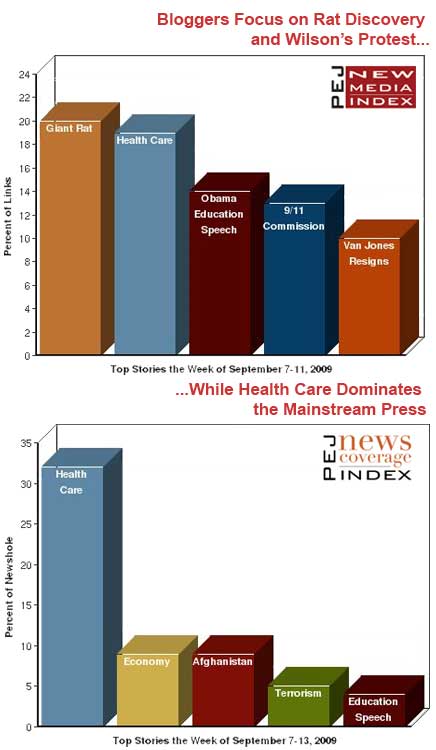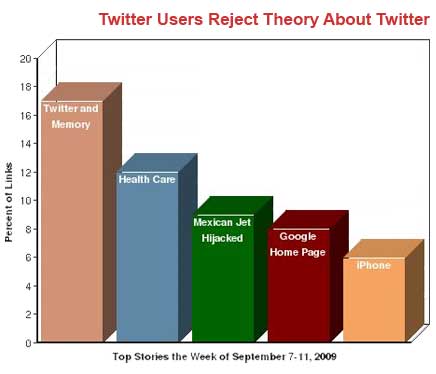
 Two dramatically different stories led the blogosphere last week-the discovery of a new kind of giant rat and a Congressman’s outburst during the President’s address on health care reform. They each got almost equal attention and combined to make up 39% of the links from blogs last week.
Two dramatically different stories led the blogosphere last week-the discovery of a new kind of giant rat and a Congressman’s outburst during the President’s address on health care reform. They each got almost equal attention and combined to make up 39% of the links from blogs last week.
For the week of September 7-11, a giant rat species discovered in a lost volcano in Papua New Guinea generated 20% of the links from blogs according to the New Media Index from the Pew Research Center’s Project for Excellence in Journalism. It follows a long line of unusual science-based stories that have gained traction in blogs.
Other offbeat scientific stories that have made the roster of top stories in the blogosphere have included a blue dye found in M&Ms (and tested on rats) that might help reduce damage caused by spine injuries, the discovery of a large meat-eating plant, a research exercise about a world-wide zombie attack and a story about British researchers who claim that some cats have learned to manipulate their owner’s emotions. Something about the nature of these bizarre science discoveries not only attract interest, but seem particularly ripe for sharing with the larger community.
The second-largest topic on blogs last week, health care and specifically the outburst by Congressman Joe Wilson, made up 19% of the week’s links and reflects another dynamic in blogs, strong partisan reactions to controversial political events.
That was followed by three other Washington-based political controversies.
Ideological rankling over Obama’s planned back-to-school speech garnered 14% of the week’s links.
Stories about members of the September 11 panel who suspected the Pentagon was not being cooperative with their investigation accounted for 13%.
And fifth (10%) was the resignation of Obama advisor Van Jones because of controversies surrounding some of his previous statements.
Two of those top five stories in the blogosphere last week also generated significant coverage in the traditional media. Health care made up 32% of the week’s newshole according to PEJ’s News Coverage Index, more than three times the amount of any other topic. And the controversy over Obama’s education speech was the fifth-largest topic with 4%.
Congressman Joe Wilson’s outburst also received major attention on Twitter, 12% of the news links with many tweets linking to a still photograph of the moment.
The most linked-to story, though, once again focused on the Twitter community. Fully 17% of the top news-focused links last week were to a column on CNET.com by Chris Matyszczyk which criticized a British psychologist for claiming that Twitter makes its users "dumber" while Facebook makes them smarter. This is the fifth time out of the last six weeks that a Twitter-focused story finished among the top three.
Rat Discovery
When an expedition team from the BBC announced it had discovered a new type of rat deep in the jungles of Papua New Guinea that can measure up to 82 centimeters (about 32 inches) long, bloggers wanted to share the discovery, adding comments along the way. The BBC report was the leading story on both Tuesday and Wednesday last week, receiving more than 60 links each day according to the tracking site Icerocket.
"Good news out of Papua New Guinea: several new species of various types have all been discovered," cheered Paul Richardson. "And you thought animals were only dying off, not being found."
Blogger Marko the Rat was particularly enamored of the critter: "He is 82cm, cute as a button and completely unafraid of humans."
Others found levity in the discovery.
"I’ve seen this movie before," joked South of Heaven. "Next they find the t-rex battling it out with the triceratops. Then King Kong."
"These guys have obviously never seen a Baltimore rat," added marie_goos.
Health Care and Joe Wilson’s Shout
More polarizing debate and discussion surrounded President Obama’s health care reform speech to Congress on September 9, which included one unexpected outburst.
"What the American people saw last night was a President who finally delivered a clear and concise plan for healthcare reform," determined Joe Baur at unpoliticalmag.com. "The President addressed concerns that ranged from the sensible to even the loopiest of fears amongst the Republican faithful."
Others thought the speech had strengths, but was still lacking.
"Mr. Obama did some eloquent things in his speech last night," admitted Neoavatara. "But the most important absence from the speech: how are we going to pay for this monstrosity?"
Most of the links and commentary, though, were aimed not at Obama but at Congressman Joe Wilson (R-South Carolina) and his "You lie!" outburst during the speech.
"Wilson lowered the dignity of his office and showed quite clearly what a bunch of bumbling simpletons the Right is now endorsing," posted Jeffrey Stingerstein at disillusionwords.com with a link to a September 10 CNN.com account of the incident. "This was not something as simple as booing and cheering in opposition to what the President said…Instead, Wilson took this to a new level and was out right disrespectful."
"Though he [Wilson] has now issued an apology, the damage to his reputation is done. Republican or Democrat, one is stripped of dignity and respect when they handle themselves in such a way and yelling such comments is just tacky," suggested Brenda Della Casa at Walking Barefoot.
While many chastised the congressman’s remark, some defended it and instead criticized his later apology.
"Heckling is just another form of dissent, and there’s nothing wrong with it, as long as it’s valid," supported Richard A. Smith. "Wilson quickly apologized for his outburst, but I don’t think an apology was necessary. Maybe for interrupting his speech, but no man should apologize for speaking his mind, or telling the truth."
"I was on Joe Wilson ‘s side until he apologized for telling the truth," wrote Ami. Mental. "Not very diplomatic to shout while the president was speaking, of course, but you know, it’s not all that diplomatic to lie to the whole country. Repeatedly. With a straight face, no less."
 Twitter and Memory
Twitter and Memory
Twitter aficionados last week took offense at the suggestion that Twitter makes its users dumber by harming their memory, while Facebook makes its users smarter. That was the theory forwarded by a Scottish psychologist Dr. Tracy Alloway. The rebuttal of that argument, which appeared on CNET News, was the most popular news-related link on Twitter last week.
Most of the messages that accompanied links to the CNET story took umbrage with Alloway’s view.
"Psychologist: Facebook makes you smarter, Twitter makes you dumber. We have a winner for the moron of the day!" tweeted Mark Sigman.
"Headline: "Facebook makes you smarter. Twitter makes you dumber." I think this article makes you dumber," added CSPierce.
"Psychologist: Facebook makes you smarter, Twitter makes you dumber (I use both, so evens out, right?)," wondered clthornton.
YouTube
The most popular news clip on YouTube last week was about health care, a topic that has frequently been among the most viewed news videos in recent weeks. But the tone of this video was in stark contrast to most of the recent favorites.
The video shows Senator Al Franken (D-Minnesota) at the Minnesota State Fair having an in-depth discussion about health care reform with a number of constituents, including some who oppose Obama’s health care proposals. This was the sixth week in a row that clips of town hall meetings have been among the lead videos on YouTube. But while previous clips displayed raucous shouting and loud protests, this encounter shows Franken and his constituents discussing the controversial issues in a civil and respectful manner.
|
Most Viewed News & Politics Videos on YouTube September 5 – 11, 2009 |
|
1. Senator Al Franken discusses health care reform at the Minnesota State Fair |
|
2. Obama’s September 8 speech to the country’s students |
|
3. A scene from the TV show Dragnet with clips of Obama edited in as the characters discuss the virtues of the country |
|
4. An ITN News report about Michael Jackson’s final burial ceremony |
|
5. A woman at a town hall meeting in California voices her support for letting the free market system be applied to health insurance |
![]()
The New Media Index is a weekly report that captures the leading commentary of blogs and social media sites focused on news and compares those subjects to that of the mainstream press.
PEJ has launched the New Media Index as a companion to its weekly News Coverage Index. Blogs and other new media are an important part of creating today’s news information narrative and in shaping the way Americans interact with the news. The expansion of online blogs and other social media sites has allowed news-consumers and others outside the mainstream press to have more of a role in agenda setting, dissemination and interpretation. PEJ aims to find out what subjects in the national news the online sites focus on, and how that compared with the narrative in the traditional press.
A prominent Web tracking site Icerocket which, monitors millions of blogs, using the links to articles embedded on these sites as a proxy for determining what these subjects are. Using this tracking process as a base, PEJ staff compiles the lists of links weekday each day. They capture the top five linked-to stories on each list (50 stories in all each week), and reads, watches or listens to these posts and conducts a content analysis of their subject matter, just as it does for the mainstream press in its weekly News Coverage Index. It follows the same coding methodology as that of the NCI. This process allows us to compare the New Media commentary, based on the Icerocket list of links, with the commentary in the traditional press. Note: When the NMI was launched in January 2009, another web-tracking site Technorati was similarly monitoring blogs and social media. PEJ originally captured both Technorati’s and Icerocket’s daily aggregation. In recent months, though, this component of Technorati’s site has been down with no indication of when it might resume.
The priorities of the bloggers are measured in terms of percentage of links. Each time a news blog or social media Web page adds a link to its site directing its readers to a news story, it suggests that the author of the blog places at least some importance on the content of that article. The user may or may not agree with the contents of the article, but they feel it is important enough to draw the reader’s attention to it. PEJ measures the topics that are of most interest to bloggers by compiling the quantitative information on links and analyzing the results.
For the examination of the links from Twitter, PEJ staff monitored the tracking site Tweetmeme. Similar to Icerocket and Technorati, Tweetmeme measures the number of times a link to a particular story or blog post is tweeted and retweeted. Then, as we do with Technorati and Icerocket, PEJ captured the five most popular linked-to pages each weekday under the heading of "news" as determined by Tweetmeme’s method of categorization. And as with the other data provided in the NMI, the top stories are determined in terms of percentage of links. (One minor difference is that Tweetmeme offers the top links over the prior 24 hours while the lists used on Technorati and Icerocket offer the top links over the previous 48 hours.)
The Project also tracks the most popular news video on YouTube each week.
*For the sake of authenticity, PEJ has a policy of not correcting misspellings or grammatical errors that appear in direct quotes from blog postings.
Note: PEJ’s weekly News Coverage Index includes Sunday newspapers while the New Media Index is Monday through Friday.


